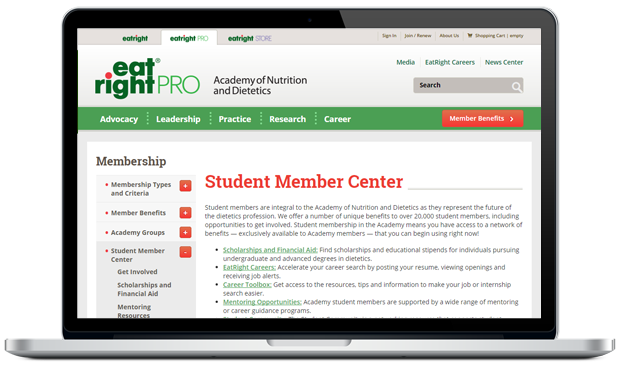Registered Dietitian Nutritionists (RDNs) are food and nutrition experts and the only healthcare professional qualified to provide nutrition advice with a clinical perspective. In order to earn the RDN credential, an individual must complete 5 steps:
 Complete a master’s degree and received a verification statement from an ACEND-accredited Didactic Program in Dietetics. Note: Effective January 1, 2024, a minimum of a master’s degree will be required to be eligible for the RDN exam.
Complete a master’s degree and received a verification statement from an ACEND-accredited Didactic Program in Dietetics. Note: Effective January 1, 2024, a minimum of a master’s degree will be required to be eligible for the RDN exam.- Complete an ACEND-accredited supervised practice program at a health-care facility, community agency, or a foodservice corporation or combined with undergraduate or graduate studies. These practice programs typically are 6-12 months in length.
- Pass a national examination administered by the Commission on Dietetic Registration (CDR). Refer to CDR’s website for more information: cdrnet.org
- Gain state licensure to practice.
- Complete continuing professional educational requirements to maintain registration.
In addition to RDN credentialing, many states have regulatory licensure laws for dietitians and nutrition practitioners. Usually these state requirement are met through the same education and training required to become an RDN.
While state interpretations of statutes may vary, it is ACEND’s considered opinion that the program meets the educational requirements for dietetics licensure and certification in all states. However, completing an ACEND-accredited academic program alone does not qualify an individual for licensure or certification as a dietitian in any state. Individuals should review their state’s licensing statutes and regulations to understand the specific requirements, including supervised practice and examinations, needed to obtain a dietetics license. More information about state licensure and certification can be found at this link: State Licensure.
Dietitians have studied a variety of subjects including food and nutrition sciences, foodservice systems management, business, economics, computer science, culinary arts, sociology and communication to science courses such as biochemistry, physiology, microbiology, anatomy and chemistry.

Registered dietitian nutritionists are qualified to work in a wide variety of employment settings including health care, business and industry, community/public health, education, research, government agencies as well as private practice. Some examples of work settings include:
- Hospitals and health care facilities
- Sports nutrition and corporate wellness programs
- Food and nutrition-related business and industries
- Private practice evaluations and management
- Community and public health settings
- Universities and medical centers
- Research facilities
As a distance program, Be Well Solutions Dietetic Internship offers a unique opportunity for interns to tailor their supervised practice hours into a program that fits each individual. Upon completion of the program requirements laid forth by ACEND interns are eligible to take the Registration Exam for Dietitians. It is ACEND’s considered opinion that the program is designed to and does meet all state dietetics licensure and certification laws.

